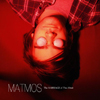Matmos’ latest album is named after a line from a Shakespeare sonnet, but it sounds, to my ears, like an echo of someone uttering the phrase “I am of two minds” about something — probably Matmos themselves, who are a great band as far as talking points go, but more equivocal in other regards. There’s an ambivalence shadowing their work: after the initial heady rush of an album/concept announcement and the positive-but-measured, explanatory reviews have rolled out, their music feels somewhat at sea, with the context in which it was exciting fading away by the week. The Baltimore-based duo of Drew Daniel and M.C. Schmidt aren’t eggheads or sensualists per se, and while it might come off like they’re playing a game of cat and mouse with listening styles, it’s far more likely that they’re just following through on their own obsessions. After the no-microphone synth outing Supreme Balloon, The Marriage of True Minds‘ methods mark a return to their hyperactive, IDM-flavored update on musique concrète.
The concept is kind of a stinker, though: Daniel kept the album’s guiding idea a secret, attempting to transmit it to sensorily deprived friends while recording their impressions. The album is based around these sessions, which often found participants fumbling with images of triangles, and is rounded out by covers — orthodox and unorthodox, respectively — of Holger Hiller and Buzzcocks tracks. It’s not that the concept is lazy or leads to disagreeable results, but that the sense of play Matmos usually bring has been codified into a kind of academic parlor game, one that’s not particularly interesting to eavesdrop on. “In Search of a Lost Faculty” seems to be the album’s thematic centerpiece: a tiresome dialogue between isolated testimony and pompously dramatic swells dotted with — what else? — chiming triangles, it contains the album’s least rewarding six minutes.
Of course, the point is well taken that, after a career spent coming up with quirky concepts, Daniel and Schmidt are turning the tables, throwing the whole mechanism into question with an appropriately silly conceit. To note the album’s intentional inconsistency is not to diminish the fact that there are genuinely satisfying moments here: “Teen Paranormal Romance” is as evocative as its name implies, putting their sampling talents in a flatteringly organic light, while “Aetheric Vehicle” marks a slight return to the Terry Riley synth dervishes of Supreme Balloon. The fussy “Ross Transcript,” on the other hand, evokes nothing so much as Sun City Girls’ imagined radio exotica, a squawking burst of otherness. Much is made of the way Matmos can jump from genre to genre, and the cover of Buzzcocks’ “ESP” that closes out the album finds them traversing the distance between multi-layered metal — black-metal howls, drone-metal riffs, and martial drumming — and a lighthearted, surf rock-y coda seasoned with cell-phone interference. More clearly than ever before, Matmos have set out to confuse the binary that opposes music as a vehicle for feeling and music as a vehicle for thought. Setting aside their intentions, The Marriage of True Minds is distractingly uneven, poking the listener’s ribs every time he or she starts to entertain more enjoyable thoughts.
















